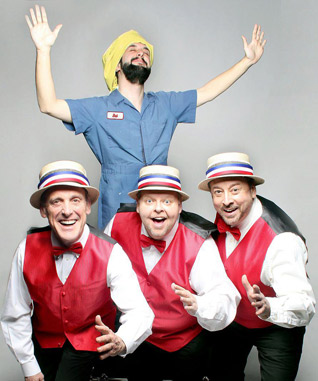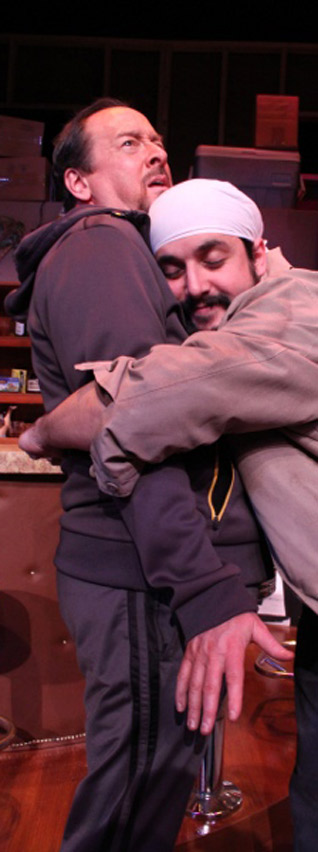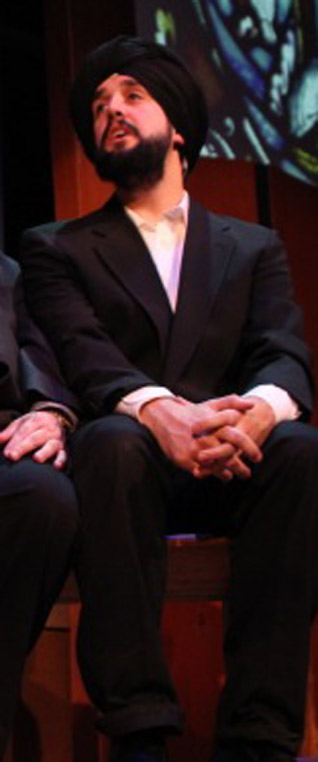Film/Stage
Life, Liberty & the Pursuit of Harmony:
The Fabulous Lipitones
GURMEET KAUR
Word had got around that "The Fabulous Lipitones" were indeed … fabulous.
But seeing was believing.
On Wednesday night (April 10) in Atlanta, Georgia, USA, the play performed to a 15th standing ovation of its world premiere with a house full of theatre lovers in the audience.
And, quite delightfully, the center of conversation in the hallway following the play was … the Sikhs.
I enjoyed fielding the audience’s questions and curiosities until the cast trickled in to mingle. They had already gotten their Sikhi-101 through Bob, the tenor singer character of the quartet which is at the heart of the performance. The play had opened a room for dialogue in the friendliest atmosphere possible.
“The Fabulous Lipitones” tells the story of a barbershop quartet in small town America; in the Atlanta version, it’s set in Babcock, Georgia.
[“Barbershop” is the term used for a music genre which began in the early 1900s, with African-Americans singing together at their neighborhood barbershop, which was, for them, a social gathering place. A “barbershop quartet” is an ensemble of four people who sing a cappella (unaccompanied vocal music) in the exacting barbershop music genre, in four-part harmony. The genre is no longer tied to the barbershop scenario; quartets are now commonly seen performing in concert-halls, conventions, parties, malls and a variety of public places.]
During a regional barbershop championship, one of their quartet unexpectedly drops dead right after their winning performance. Desperate to find a replacement before the finals in Reno, Nevada, they run into Bob, a Sikh with suspicious immigration credentials but the one who sings a tenor like no other.
Through song and humor, the newly formed atypical group struggles to find harmony, both vocally and personally, on their road to victory when they compete in finals against the team, “Sons of Pitches,” in the national championships.
The play is groundbreaking in many ways.
A Sikh in a barbershop quartet is a loaded paradox in itself. But, this is 21st century America where Lady Liberty stands at the gates and proclaims – "Give me your tired, your poor, your huddled masses yearning to breathe free ...”
And aptly so.
Bob reminds his colleagues very gently that their Italian or Irish ancestors too were once immigrants.
Looking at the history of barbershop music, it only makes sense that the transience from Black harmony to a White one would eventually be open to absorbing some Bhangra. At least in the play.
The play lays open, with no holds barred, all the stereotypes an ignorant American may have when they see a Sikh for the very first time. You name it: q-tip, Hajji, beehive, al qaeda … and a surprise one, kamasutra boy.
And one by one each stereotype is dispelled through adorable Bob, his beautiful voice and unbridled enthusiasm that help harmonize not only the quartet but everyone in the audience.
As Phil, the suspicious bass singer, puts it: “It’s human nature to be afraid of people until you know them and once you know them – you are not afraid anymore – they just annoy the hell out of you”.
When Howard, the baritone singer protests to the others in the trio, after seeing Bob for the first time, that ‘he is not one of us’, Wally, the lead, replies: “Why? He still got his prostrates?”
They laugh at each other, they laugh together and as a team they eventually complete each other.
The show offers more than a few things for Sikhs to enjoy and celebrate.
Not only is it the pure entertainment value, but its educational value is far more reaching and impacting than any other medium. It helps those in the audience to immediately connect Bob with a real life Sikh sitting right alongside them, or someone they know at work or as a neighbour.
Secondly, for the local Sikh communities, it’s a front-door to get engaged in mainstream theatre. This play drove the Sikh community in Atlanta out of their comfort zone into new and, for them, unchartered, territory. I was delighted to read a Sikh name in the “Host Committee” and two gurdwaras listed as partners in the programme.
Our community stepped out, it mingled, it learnt, it taught.
It laughed. It had fun.
It got engaged in the process. At the same, it helped ensure that we were represented accurately.
When the play was first written, John Markus, the Emmy and Peabody award winning co-writer of the play, came up with the idea of a Sikh as the fourth character. He had come across Sikh taxi-drivers in New York and had a positive image of them … which is so artistically reflected in the play.
When the play was first taken on by “The Theatrical Outfit” in Atlanta with an immigrant Sikh character in the story line, Tom Key, the Executive Artistic Director, was introduced to the local Sikh community via one of the play sponsors, James Keller, who is also a member of the Faith Alliance of Metro Atlanta.
Dr. Gulbarg Singh Basi, one of the pioneer Sikhs of the Atlanta community who also happens to be active in the Alliance, connected Tom to all the Sikh gurdwaras and the process of looking for the actor began. Tom and his team tried hard to find a Sikh to play the character – they visited each of the four gurdwaras, they talked to every eligible young man they could find – but the question was: could he sing the tenor?
They searched frantically, leaving no casting agent or theatrical outreach resources in metro Atlanta untouched, and finally found Daniel Hilton, an outstanding local actor who did more than justice to the role, and dazzled the Sikh community too.
Tom brought Daniel to the gurdwara. Daniel was already growing his beard for the role and had studied all about his character. He was taught to wear a turban. The sangat thought he was a new Sikh in the town.
At the end of the show on Wednesday night, many in the audience unfamiliar with Daniel kept thinking he was indeed a Sikh from Punjab. He not only sings a Punjabi song in the show but teaches the trio, the cornball movers, a thing or two about Bhangra.
The play is intelligently written, to say the least. But one can’t expect any less when writers have on their repertoire works like “The Cosby Show”, “Taxi” and “The Larry Sanders Show”.
It is directed fantastically, it keeps moving you through the adventures of the quartet as a group while taking the time to show more poignant and personal moments.
And the music – it will take you down the glorious bygone era of the American Barbershop days, especially its heydey in the early 1900s, and you’ll think that the group has been singing together for years.
This is one show not to be missed.
It will make you laugh and cry, and then laugh again. It will warm your heart and add a spring to your step as you leave the theatre. If you have a sense of humor you will love the experience, and if you don’t, it will infuse you with one.
* * * * *
Finally, here’s what Tom Key, the Executive Artistic Director, had to say about the project:
“It is often difficult to authentically dramatize a character on stage who is good, kind and joyful without the character being perceived as unrealistic, naïve or lacking intelligence.
"One of the great accomplishments of this play is that the Sikh character named “Bob” played by actor, Daniel Hilton, embodies Sikh values of truth, peace, joy, mercy and kindness in a way that is credible and compelling. As Executive Artistic Director of Theatrical Outfit, a member of the cast, and in working with the Sikh community of Atlanta, particularly Gogi (Gulbarg) Singh Basi and Parvinder Singh, this topic was discussed often.
“One word a cast member used to describe Bob was ‘shrewd‘ and this reminded me of what Jesus said to his disciples in Matthew Chapter 10, ‘Behold, I send you forth as sheep in the midst of wolves: be ye therefore wise as serpents, and harmless as doves.’ Perhaps a similar admonition is expressed to Sikhs for behavior out in the world.
“Daniel Hilton’s performance as Bob demonstrated this same kind of shrewdness or strategic kindness in that he was so happy and hopeful and accepting as compared to the three American non-Sikh characters who continually argued and bickered with one another and only changed when confronted by Bob about their character flaws and moral failings. Even in the face of unredeemable bigotry and racism that Bob suffers from his deceptive and abusive employer, he never returns evil with evil, but patiently persists with behavior that is good and beyond reproach. When Bob remarks to another character, “You are really very Sikh like”, it is recognized by the audience as the compliment of highest value in the course of the entire story.
“By the end of the play, it is the non-Sikh Americans of the barbershop quartet, ‘The Fabulous Lipitones‘, who are transformed to better people, more accomplished musicians and more devoted friends by adapting toward Bob, by accepting and respecting his boundaries, by turning from their smaller bickering familiar world to embrace the new transformative joyful reality that Bob incarnates.
“‘Most importantly, the audience witnesses how a person can go out into the ‘midst of wolves‘ and rather than be the helpless victim of a tragic story or the ridiculed simpleton of a farce, he or she can, by the power of faith, lovingly transform enemies into friends and conclude the story as another example of a divine comedy.”
The ‘world premiere’ performances of "The Fabulous Lipitones" run in Atlanta in the Balzer Theater at Herren's, through April 21. To purchase tickets, please CLICK here.
The show opens at Connecticut's famed Goodspeed Opera House in May. Please CLICK here for more information.
Other communities wishing to have the play staged locally, please contact your local small professional theatres or the likes and ask them to bring “The Fabulous Lipitones” to your towns.
April 13, 2013
Conversation about this article
1: Inni Kaur (Fairfield, Connecticut, USA), April 13, 2013, 8:13 AM.
This is just brilliant. Can't wait for the show to come to Connecticut. Thanks Gurmeet, for bringing this to us ...
2: Amarjit Singh Duggal (Atlanta, Georgia, USA), April 13, 2013, 6:02 PM.
"Power of faith, lovingly transforms enemies into friends ..." Wonderful statements. Congratulations for a great story!
3: H S Vachoa (Chicago, Illinois, USA), April 13, 2013, 11:38 PM.
Fine artists!
4: T. Sher Singh (Mount Forest, Ontario, Canada), April 14, 2013, 5:54 AM.
For several years while practicing law, I shared a store-front law office with a close friend and fellow-lawyer, Don McKinnon (who, sadly, passed away a few years ago). It became an annual tradition with us -- and within the city's (Guelph) legal profession -- that we (Don and I) would host a party at Christmas time. The invitation would go out in the form of a leaflet in our names, describing ourselves as "Brothers-in-Law" and it was invariably heavily attended by all within the local Law & Order scene -- friends, clients, lawyers, law-firm staff members, judges, court-room staff-members, the police, friends from City Hall which was literally across the road from us, and a whole slew of local politicians, including the Mayor, and the local MP's. A long-standing "barbershop quartet" consisting of a few senior lawyers and their friends quickly appointed themselves as our official entertainment and thus became a much loved annual feature. Our annual invitation, which doubled as their playbill for the event, soon came to advertise the quartet around town as the "T. Sher Singhers"!
5: Aryeh Leib (Israel), April 14, 2013, 6:38 AM.
When are they coming to Tel-Aviv?
6: Jasmeet Kaur (Rochester, New York, USA), April 14, 2013, 5:49 PM.
Here's how we can truly commemorate Vaisakhi today: a) Buy tickets to "The Fabulous Lipitones", if we are in the vicinity of its stagings, and see a performance - with family and all. b) Try and get the theater company to come and stage it in our respective towns and cities. c) Put our money and resources into such projects. d) Surely this play can be turned into a movie script. Anybody in our community who has more money than they could possibly spend on themselves? Here's a good investment.
7: Kulvinder JIt (Niagara Falls, Canada), April 22, 2013, 10:11 AM.
How can we get them to Toronto and other big cities in Canada? Worth giving a serious thought.
8: Parvinder Singh (Atlanta, Georgia, USA), April 24, 2013, 11:51 AM.
Kulvinder Jit ji - I will get back to you with the details. A little background - The Atlanta Interfaith Group had approached Tom Key some time ago and asked him to produce a play especially from an interfaith perspective, aimed at creating harmony and peace. The play that was discussed was "A Long Bridge Over Deep Waters", but for certain reasons it didn't work out. When Tom came across this play, he found it suitable and that's how Theatrical Outfit got into it. I am very proud of, and glad to see, the show. My thoughts - It is one of the most important break-through projects which introduces Sikhs and Sikhism with a very different perspective. We are bringing a Sikh on stage not because there was a bullying incident or 9/11 or Wisconsin, but here is a play which really is for entertainment, humor, some rib-tickling fun and a Sikh is very nicely blended into it. As Tom Key says, it is the "immense power of humor", a subtle message/teaching creeps in from the backdoor and creates a lifelong impact. A lesson for Bollywood. It has failed in portraying Sikh characters in the Indian movies. A Sikh is almost always shown in a negative light. Bob has a very strong character in the play. Unflinching positivity or chardi kala is clearly depicted through his words and actions.






